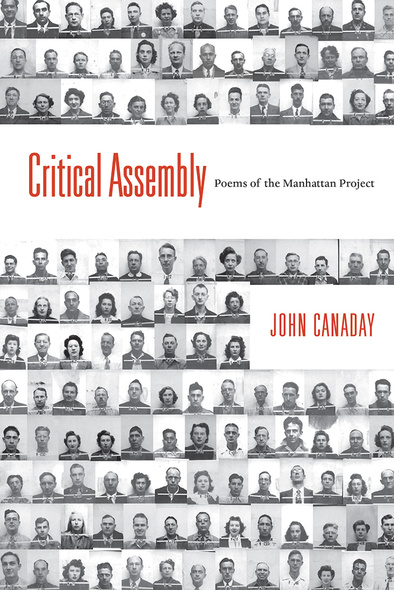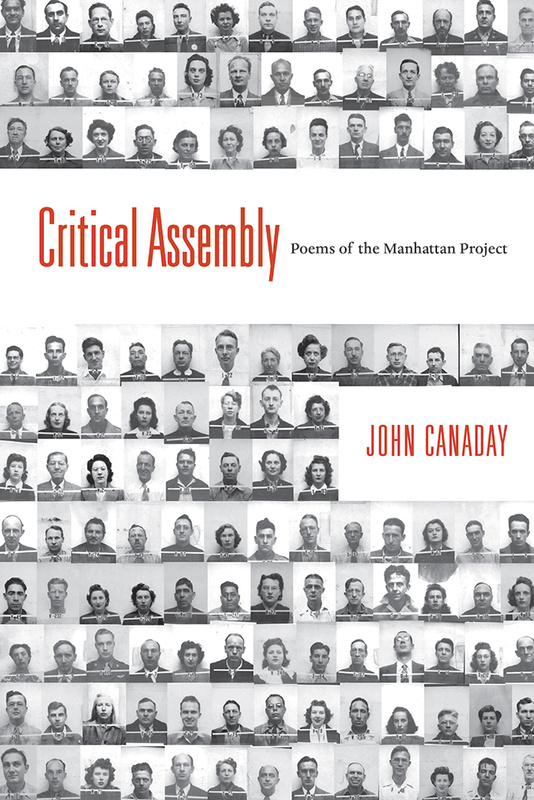Our shopping cart is currently down. To place an order, please contact our distributor, UTP Distribution, directly at utpbooks@utpress.utoronto.ca.
With technical mastery and remarkable empathy, Canaday introduces readers to the people involved in the creation and testing of the first atomic bomb, from initial theoretical conversations to the secretive work at Los Alamos. Critical Assembly also includes brief biographies, notes, and a bibliography for further exploration about this critical event in world history.
[Canaday has] transformed the events and facts into engaging literary works, no small achievement. . . . An ambitious work of poetry.'--Rain Taxi
Human frailty and genius, human work of horror and salvation, human foibles and superhuman forces: in Critical Assembly John Canaday deploys lyric poetry, with terrific formal intelligence, to tell anew the enduring, fate-ridden story of the Manhattan Project.'--Robert Pinsky, former US Poet Laureate
Most of the men and women who invented the first atomic bombs are gone now, but the moral and mortal complexity of their work continues to challenge us. These moving, resonant poems revivify them even as they open that complexity to our understanding.'--Richard Rhodes, author of The Making of the Atomic Bomb
Who ever thought that a nuclear holocaust could be turned into poetry? But here it is. A cornucopia of apocalyptic delights. End of the world poetry by many of the people who created its possibility--Leo Szilard, Albert Einstein, Otto Frisch, Robert Oppenheimer, Eugene Wigner, Edward Teller, et al. It's an answer to Mark Twain's purported dictum: History may not repeat itself, but it rhymes. Or, in the words of Manhattan Project physicist Philip Morrison on the eve of the first atomic blast: 'Only the past is certain. But the future rhymes.' John Canaday has created a remarkable book. Perverse, original, outstanding, and gut-wrenching.'--Errol Morris, Academy Award-winning director of The Fog of War
The Manhattan Project now has its Poet Laureate-Historian. Canaday's Critical Assembly is a tour de force of poetry and penetrating history that bores brilliantly into the Los Alamos experience to reveal the inner thoughts and lives of the Promethean community that altered humanity's fate during World War II.'--Martin J. Sherwin, coauthor of American Prometheus: The Triumph and Tragedy of J. Robert Oppenheimer
John Canaday has given us a unified series of poems that may well stand among the greatest works of poetry in this twenty-first century.'--X. J. Kennedy, author of Nude Descending a Staircase
John Canaday is the author of The Invisible World: Poems and The Nuclear Muse: Literature, Physics, and the First Atomic Bombs. His poetry has been widely published.
Medialog: William Laurence
U / Potential
Albert Einstein (Life is finite)
Leo Szilard (In 1913, H.G. Wells)
Eugene Wigner (Hatred's homicidal)
Otto Frisch (Chancellors come and go)
Max Delbrück (Niels Bohr was God)
Otto Frisch (Rare earth sparks the clouds)
Leo Szilard (Not everyone can be as fortunate as Christ)
Albert Einstein (The Czechoslovak state is occupied)
Edward Teller (Now Einstein knows me)
Janet Coatesworth (I spent each August in the steno pool)
Albert Einstein (The grass is hazy)
Ek / Kinetic
Alexander Sachs (History's hard)
Leslie Groves (Oh, that thing)
Edith Warner (Who needed mountains)
Robert Serber (Oppie and his brother)
John Dudley (No matter what your weapons are)
Edith Warner (Luck finds me when I least expect it)
John Dudley (But "Oppie" has his own ideas)
Louis Slotin (On the train from Oak Ridge)
Dorothy McKibben (Each day a stream of new lost souls)
Robert Serber (When Oppie's first recruits arrived)
Richard Feynman (Once people thought that angels)
Edward Condon (Dammit, Oppie's always right)
Louis Slotin (I've been called a cowboy)
Peer de Silva (Tigers roam the globe)
Edward Teller (Wigwam calls us Martians)
Ruth Marshak (Tech was a pit)
James Nolan (What were we making: babies)
John Dudley (By then I'd had it up to here)
Bernice Brode (Mary knows what's what)
Edward Teller (Bethe made the Head of Theory?)
Klaus Fuchs (Hitler disliked my politics)
Eugene Wigner (We are all guests)
Edith Warner (Venus hangs low above the mountains)
J. Robert Oppenheimer (The snows came early)
Kitty Oppenheimer (Though I was born a German princess)
James Nolan (Petey didn't pity whores)
Robert Serber (Most days it was easy to forget)
Willy Higinbotham (Lightning snaps at the windows)
Appolonia Chalee (Mrs. Fisher's superstitious)
Edith Warner (Over the years I learned their rituals)
Niels Bohr (Nature is the wildest West)
John Lansdale Jr. (Horns blare. Dust burgeons)
Kitty Oppenheimer (Now morning sickness is the proof of love)
Dorothy McKibben (We mustn't speak of doctors)
Antonio Martinez (Crisp, starched khaki)
Kitty Oppenheimer ("Hell yes, I have ID")
Chien-Shiung Wu ("Damn kraut")
Donald Mastick (Wonder of the work)
Richard Feynman (Man's main concern is man)
Louis Slotin (My work requires grace)
Kitty Oppenheimer (When Robert planted Peter in my gut)
∆H / Heat
Rose Bethe (We beat the Nazis on a Tuesday)
Joseph Rotblat (Spay nature)
John Dudley (In Luzon, everybody thought)
George Kistiakowsky (I don't know much about luck)
Louis Slotin (The core assembly was as riveting)
Dorothy McKibben (How near we are to dying)
Norris Bradbury (Some things you can control)
Edward Teller (Our drab green school bus shudders)
Frank Oppenheimer (LeMay's been roasting towns again)
Donald Hornig (The cradle rocks)
Edward Teller (It's midnight)
Leslie Groves (Stick to your knitting)
Philip Morrison (Prone on a dike)
Edward Teller (The seconds limp, then stumble)
Thomas Farrell (Great poets dream of clarity)
Victor Weisskopf (I looked at zero through dark glass)
J. Robert Oppenheimer (After the first flash)
Joan Hinton (The silence lingers longest)
David McDonald (That morning at my brother's)
Hans Bethe (Nothing like the sun)
Norris Bradbury (When Trinity went off)
David Nicodemus (Dear Mami)
Harriet "Petey" Peterson (Smitty's smitten)
David McDonald (And it was quite a while)
Joe Willis (We'd wished for miracles)
Edith Warner (As season follows season)
J. Robert Oppenheimer (We lost the moon among mountains)
Acknowledgments
Notes on Poems
Sources
Biographical Notes





